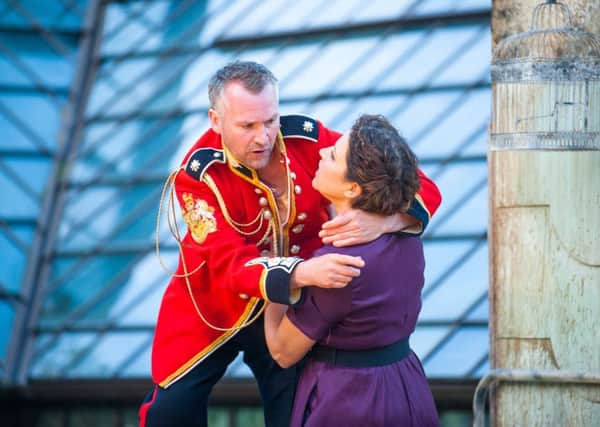Theatre review: Macbeth


This is Gordon Barr’s new production of Macbeth, playing on the Botanics main stage as part of the Bard In The Botanics season; and although its intense hundred-minute take on this most famous of plays has its disappointing moments, it shows a level of invention that sometimes takes the breath away with its risk-taking boldness.
Macbeth ****
Botanic Gardens, Glasgow
Before the play as we know it even begins, we see a re-enactment of the tragedy that might have triggered the drama, as Nicole Cooper’s passionate yet vulnerable Lady Macbeth approaches the cradle, and finds her beloved baby dead.
Advertisement
Hide AdHere, and throughout the whole show, Juta Pranulyte’s remarkable soundtrack weaves ominous sounds of battle, of babies’ cries and of women weeping, through and around our heads, on the woodland slope where we sit.
Then the story begins to take shape, with Alan J Mirren’s Duncan morphing smoothly into Macduff, Emilie Patry’s impressive female Banquo into Lady Macduff; and Elkin always watching terrifyingly from the corners of the action, like some shape-changing spirit of justice or revenge bent on bringing Macbeth to his doom.
In this context, Kirk Bage’s Macbeth often seems strangely subdued, never given the chance to establish himself as the mighty warrior hero of Shakespeare’s early scenes, and hemmed in from the start by his own limitations, and by grim intimations of doom.
Every one of Lady Macbeth’s scenes is played to the hilt, though; the sleepwalking sequence chills the blood, as does Lady Macbeth’s appearance as a stricken observer at the death of Lady Macduff and her children. And If the final scenes of this sharply-cut version seem abrupt, and suffer from the absence of some of Shakespeare’s perfectly-paced poetry, the overall effect is strikingly raw and vivid; nor is there any consoling coda here about the return of good governance to Scotland, or about Malcolm’s royal progress to Scone, to be crowned.
*Until 30 July